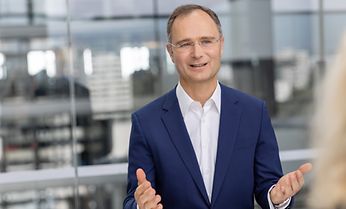Service Navigation
Why sustainability needs a strong European capital market
11 Aug 2022
Why sustainability needs a strong European capital market
If we want to successfully transform Europe's economy into a climate-neutral and sustainable one, we need a more extensive Capital Markets Union, a transformation taxonomy, and practicable solutions for reporting requirements and financial regulations, demands Stephan Leithner, Executive Board Member at Deutsche Börse AG, in his opinion piece.
Stephan Leithner, Member of the Executive Board
of Deutsche Börse AG
What course must we set for the sustainable transformation of our economy to succeed? How do we secure the competitiveness of Germany and Europe and achieve more sovereignty? These questions are becoming more urgent with each passing day in the face of new geopolitical realities – and at the same time the room for error is getting smaller. So, what should we do?
The public sector and the banking sector alone cannot make the investments necessary for this transformation. It is therefore crucial to have a European capital market with sufficient liquidity and market depth. Without the capital market, the transformation to a climate-friendly economy will not only be significantly more difficult, but also less efficient and much more expensive.
It is not only about deep green assets
The reason is obvious: transformation needs innovation. The mobilisation of capital necessary for this takes place primarily on the capital market. Isolated solutions are not called for here; rather, we need to think holistically to put sustainability at the centre for the entire capital market. This is the only way to unlock new asset classes, styles and themes and to mobilise capital – for the benefit of the real economy.
All this can only succeed within a consistent political framework. This allows companies to plan and financial actors to help bear the risks inherent in change, minimise them and support the transformation of the economy with their investment decisions. A lot of good progress has already been made in Europe in this regard.
The taxonomy as a classification system is a first attempt at an approach to create transparency and guidance. However, this classification logic will only prevail if it is technology-agnostic as well as practice- and user-oriented and if it takes the transformation phase adequately into account. It is not only about investing in deep green assets, but also and especially about investing in transforming companies to finance their transformation strategies. This is especially true in Germany with its strong industrial base and innovative SMEs.
Practicable solutions needed
Holistic sustainability and especially the path to achieving it are multifaceted and complex. Even beyond the European Parliament’s recent decision to classify nuclear energy and gas as sustainable economic activities, we will continue to be confronted with questions that defy simple and binary answers.
What is needed, therefore, are practicable solutions, legal certainty as quickly as possible and room for a pragmatic transformation classification; this will also help not to damage the “green” taxonomy and its acceptance. This is how it can become the instrument it was originally intended to be: a science-based benchmark intended to strengthen market-driven processes.
But is that enough? I see three key starting points to move this process forward.
Firstly, uniform reporting standards and a coherent EU regulatory framework for all financial market players
We need coherence across the plethora of sustainability-related regulatory frameworks. At every step along the investment chain, it must be clear which requirements sustainable financial instruments must fulfil to be designated and marketed as such. Otherwise, a lack of clarity and coordination threatens to slow down sustainable change. Timing is also crucial: reporting standards must be adopted before companies are obliged to report.
Particular attention should also be paid to ensuring that companies report ESG information that is actually material for them – in this way reporting is not reduced to an end in itself. Coordination in terms of content and timing is also necessary in view of the international developments around the International Sustainability Standards Board.
Secondly, reliable and comparable data on sustainability aspects
Disclosure, common standards and a comparable data landscape allow providers of analytical tools to generate services with real added value and to use sound ESG information as the basis for informed investment decisions. Independence, transparency and reliability in ESG ratings are essential here, but at the same time providers need to be free to choose the methodology that best fits a particular business model, industry conditions and what particular investors may need to know.
Thirdly, a European Capital Markets Union
European capital markets are still too fragmented and thus hinder the free flow of capital between countries. To fully unleash the transformational power of the capital market, it is necessary to facilitate European companies’ access to capital markets and to simplify cross-border transactions. An efficient and complete Capital Markets Union makes a decisive contribution here.
The recent establishment of the International Sustainability Standards Board (ISSB) in Frankfurt/Main has shown: The world trusts Europe to be a thought leader on sustainability. But this is not a fait accompli – the competition never sleeps. Let's get ready for it sooner rather than later. We Europeans must live up to the expectations that others have of us – and turn them into tangible location advantages. The EU must not miss this opportunity to set an example as a thought leader with a holistic view of sustainability and at the same time remain competitive.
If we manage to implement this holistic approach together in the EU, we will not only contribute to Europe’s future and competitiveness but will also be a global trend-setter in thought leadership.
By Stephan Leithner
The article was first published in Tagesspiegel on 11 August 2022 (German).


